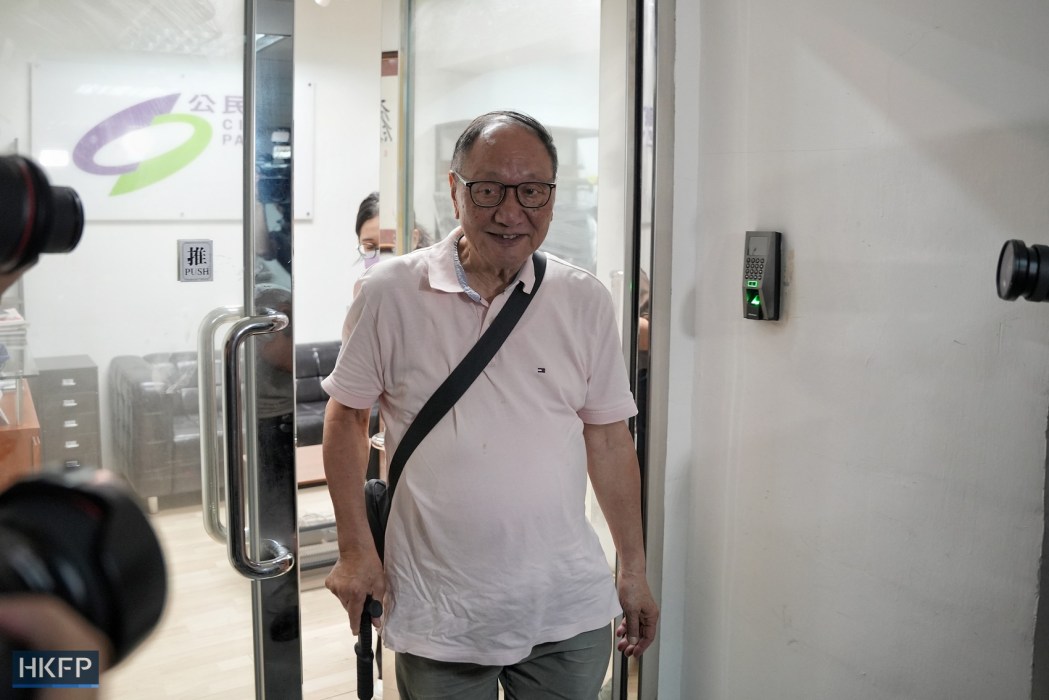Hong Kong pro-democracy political party Civic Party has voted to dissolve. The decision came after the party’s executive committee posts were left vacant as no members filed nominations to take up positions.

Members of the Civic Party passed a motion in an extraordinary general meeting on Saturday to wind up the company, saying that a liquidator had already been appointed. Thirty-one people attended the meeting, with 30 people voting for the motion; one person abstained.
Civic Party Chairperson Alan Leong thanked “all liked-minded people” who joined the party’s “long walk to democracy for different parts of the journey” in a statement handed out on Saturday.
Even though democracy had “yet to be accomplished,” Leong said in the statement that he hoped “the concepts of accountability and open government have been adequately introduced to the people.”

“While the Civic Party has not accomplished what we set out to do, there is a time for everything,” the chairperson wrote, adding that the party had to be “wound up voluntarily” due to a lack of succession to the party’s leadership and the group’s financial constraints.
Stephen Char, a barrister and founding member of the Civic Party, said while he would miss the other party members, he did not feel sad about the dissolution of the party.
“Because I understand, coming together or dispersing, is a fact of life,” Char said outside the Civic Party headquarters after the meeting.

“We may not have everything, but one thing we must maintain, that is our conscience,” he continued, adding “we can give up everything, but never never give up hope.”
Blow to democracy movement
The Civic Party, dubbed the “barrister party,” was known for representing professionals in Hong Kong, including lawyers, accountants, and academics. Political scholar Kuan Hsin-chi was the party’s first chairperson, while Senior Counsel Audrey Eu was its founding leader.
Its dissolution marked a further blow to Hong Kong’s pro-democracy movement, which has suffered losses in recent years. An overhaul of the city’s electoral system to ensure that only “patriots” can govern has effectively shut opposition out of the legislature, while a number of pro-democracy civil society groups – including the Civil Human Rights Front and the Hong Kong Confederation of Trade Unions – have disbanded in the wake of the Beijing-imposed national security law.

Established in 2006, at “a time when Hong Kong found itself at the height of a political debate about how the Chief Executive and all members of the legislature would be elected,” the party grew to be the city’s second-largest pro-democracy party after the Democratic Party. In the 2019 District Council election, when the pro-democracy camp won with a landslide, the Civic Party took 32 seats.
Since 2008, the party held seats in the Legislative Council (LegCo). Three of its members – Alvin Yeung, Dennis Kwok, and Kwok Ka-ki – were ousted from the legislature in November 2020 along with Kenneth Leung for being “unpatriotic.”
Their disqualifications triggered mass resignations by opposition legislators, leaving the legislature with mostly Beijing loyalists.

The party did not take part in the 2021 LegCo election, which went ahead after a drastic overhaul to the electoral system following Beijing’s decision to ensure only “patriots” govern Hong Kong.
Former members call for disbandment
In April 2021, four former Civic Party members charged under the Beijing-imposed national security law called for the party to disband.
Yeung, Jeremy Tam, Kwok Ka-ki and Lee Yue-shun said in a letter that the Civic Party “has completed its historical mission.” The four were among the 47 democrats accused of conspiring to commit subversion under the sweeping security law, after they organised or took part in an unofficial primary election for the then-postponed LegCo election.
Yeung, Tam, and Kwok, who were denied bail in March 2021, pleaded guilty, while Lee, who was granted bail, pleaded not guilty.
In June 2020, Beijing inserted national security legislation directly into Hong Kong’s mini-constitution – bypassing the local legislature – following a year of pro-democracy protests and unrest. It criminalised subversion, secession, collusion with foreign forces and terrorist acts, which were broadly defined to include disruption to transport and other infrastructure. The move gave police sweeping new powers, alarming democrats, civil society groups and trade partners, as such laws have been used broadly to silence and punish dissidents in China. However, the authorities say it has restored stability and peace to the city.
Support HKFP | Policies & Ethics | Error/typo? | Contact Us | Newsletter | Transparency & Annual Report | Apps
Help safeguard press freedom & keep HKFP free for all readers by supporting our team
























